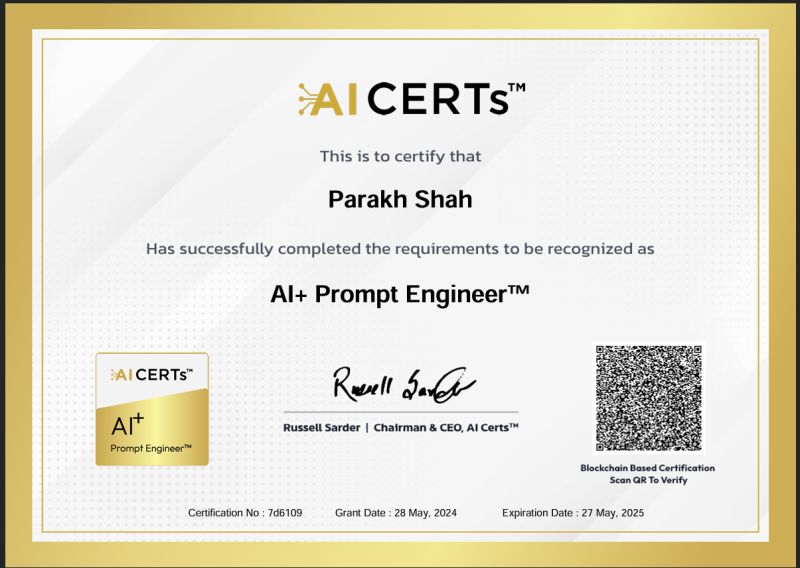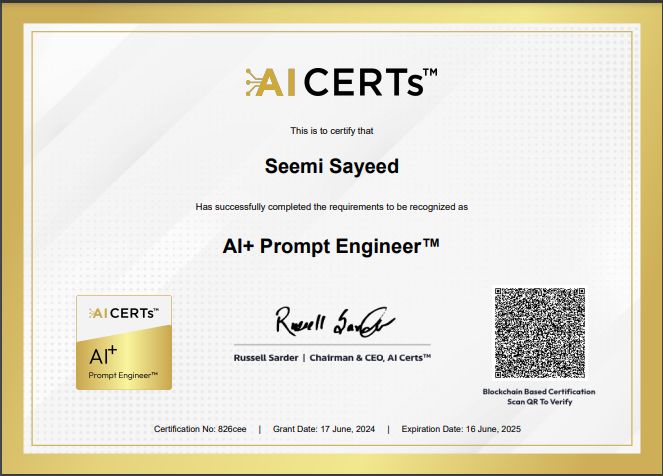AI+ Prompt Engineer Level 1™
AC-130
Master AI Prompts: Elevate Your Engineering Skills- Foundational Knowledge: Covers generative AI, ML, NLP, and neural networks essentials
- Hands-on Learning: Offers practical training in designing and optimizing prompts
- Industry-Relevant Skills: Prepares learners to build effective AI solutions across sectors
- Prompting Expertise: Certifies participants to craft impactful, domain-specific prompts
Why AI Prompt Engineer Level 1™? 10X AI Innovation Impact
At a Glance: Course + Exam Overview
- Instructor-Led: 1 day (live or virtual)
- Self-Paced: 6 hours of content

Who Should Enroll?
Research Scientists: Advance your research with AI by creating and utilizing effective prompts to explore new scientific data and solve complex problems.
Data Scientists & Analysts: Enhance your ability to optimize machine learning models by mastering prompt engineering for better data analysis and insights.
Developers & Programmers: Learn to build, refine, and deploy AI-driven applications by creating efficient prompts for improved AI system performance.
Business Leaders & Strategists: Gain the skills to incorporate AI solutions into business strategies, optimizing processes and decision-making.
Machine Learning Engineers: Strengthen your expertise by learning how to fine-tune AI prompts to enhance the performance of machine learning models.
Industry Growth: Fueling Innovation in AI Communication & Content Creation
- The global prompt engineering market is projected to reach $2.06 billion by 2030, reflecting a compound annual growth rate (CAGR) of 32.8%. (Grand View Research)
- As AI adoption accelerates, industries such as healthcare, finance, and retail are actively seeking prompt engineers.
- Prompt engineers are crucial in refining AI outputs, ensuring that models generate relevant and accurate responses.
- With the rise of AI-powered tools, prompt engineers play a key role in shaping how AI models perform.

Skills You’ll Gain
- Familiarity with Neural Networks
- Basics of Natural Language Processing (NLP)
- History and Concepts of AI
- Designing Effective AI Prompts
- Practical Application of Prompt Engineering
- Project-Based Learning in AI Prompting
What You'll Learn
- Course Introduction
- 1.1 Introduction to Artificial Intelligence
- 1.2 History of AI
- 1.3 Machine Learning Basics
- 1.4 Deep Learning and Neural Networks
- 1.5 Natural Language Processing (NLP)
- 1.6 Prompt Engineering Fundamentals
- 2.1 Introduction to the Principles of Effective Prompting
- 2.2 Giving Directions
- 2.3 Formatting Responses
- 2.4 Providing Examples
- 2.5 Evaluating Response Quality
- 2.6 Dividing Labor
- 2.7 Applying The Five Principles
- 2.8 Fixing Failing Prompts
- 3.1 Understanding AI Tools and Models
- 3.2 Deep Dive into ChatGPT
- 3.3 Exploring GPT-4
- 3.4 Revolutionizing Art with DALL-E 2
- 3.5 Introduction to Emerging Tools using GPT
- 3.6 Specialized AI Models
- 3.7 Advanced AI Models
- 3.8 Google AI Innovations
- 3.9 Comparative Analysis of AI Tools
- 3.10 Practical Application Scenarios
- 3.11 Harnessing AI’s Potential
- 4.1 Zero-Shot Prompting
- 4.2 Few-Shot Prompting
- 4.3 Chain-of-Thought Prompting
- 4.4 Ensuring Self-Consistency in AI Responses
- 4.5 Generate Knowledge Prompting
- 4.6 Prompt Chaining
- 4.7 Tree of Thoughts: Exploring Multiple Solutions
- 4.8 Retrieval Augmented Generation
- 4.9 Graph Prompting and Advanced Data Interpretation
- 4.10 Application in Practice: Real-Life Scenarios
- 4.11 Practical Exercises
- 5.1 Introduction to Image Models
- 5.2 Understanding Image Generation
- 5.3 Style Modifiers and Quality Boosters in Image Generation
- 5.4 Advanced Prompt Engineering in AI Image Generation
- 5.5 Prompt Rewriting for Image Models
- 5.6 Image Modification Techniques: Inpainting and Outpainting
- 5.7 Realistic Image Generation
- 5.8 Realistic Models and Consistent Characters
- 5.9 Practical Application of Image Model Techniques
- 6.1 Introduction to Project-Based Learning in AI
- 6.2 Selecting a Project Theme
- 6.3 Project Planning and Design in AI
- 6.4 AI Implementation and Prompt Engineering
- 6.5 Integrating Text and Image Models
- 6.6 Evaluation and Integration in AI Projects
- 6.7 Engaging and Effective Project Presentation
- 6.8 Guided Project Example
- 7.1 Introduction to AI Ethics
- 7.2 Bias and Fairness in AI Models
- 7.3 Privacy and Data Security in AI
- 7.4 The Imperative for Transparency in AI Operations
- 7.5 Sustainable AI Development: An Imperative for the Future
- 7.6 Ethical Scenario Analysis in AI: Navigating the Complex Landscape
- 7.7 Navigating the Complex Landscape of AI Regulations and Governance
- 7.8 Navigating the Regulatory Landscape: A Guide for AI Practitioners
- 7.9 Ethical Frameworks and Guidelines in AI Development
- 1. What Are AI Agents
- 2. Applications and Trends of AI Agents for Prompt Engineers
- 3. How Does an AI Agent Work
- 4. Core Characteristics of AI Agents
- 5. Importance of AI Agents
- 6. Types of AI Agents
Tools You’ll Master

LangChain

OpenAI's GPT-4
Prerequisites
- Understand AI basics and how AI is used – no technical skills required.
- Willingness to think creatively to generate ideas and use AI tools effectively.
Exam Details
Duration
90 minutes
Passing Score
70% (35/50)
Format
50 multiple-choice/multiple-response questions
Delivery Method
Online via proctored exam platform (flexible scheduling)
Exam Blueprint:
- Foundations of Artificial Intelligence (AI) and Prompt Engineering – 10%
- Principles of Effective Prompting – 15%
- Introduction to AI Tools and Models – 15%
- Mastering Prompt Engineering Techniques – 20%
- Mastering Image Model Techniques – 15%
- Project-Based Learning Session – 12%
- Ethical Considerations and Future of AI – 12%
Choose the Format That Fits Your Schedule
What’s Included (One-Year Subscription + All Updates):
- High-Quality Videos, E-book (PDF & Audio), and Podcasts
- AI Mentor for Personalized Guidance
- Quizzes, Assessments, and Course Resources
- Online Proctored Exam with One Free Retake
- Comprehensive Exam Study Guide
Instructor-Led (Live Virtual/Classroom)
- 1 day of intensive training with live demos
- Real-time Q&A and peer collaboration
- Led by AI Certified Trainers and delivered through Authorized Training Partners
Self-Paced Online
- ~6 hours of on-demand video lessons, e-book, and podcasts
- Learn anywhere, anytime, with modular quizzes to track progress
Discover Your Ideal Role-Based Certifications and Programs!
Not sure which certifications to go for? Take our quick assessment to discover the perfect role-based certifications and programs tailored just for you.
Get CertifiedFrequently Asked Questions
The course combines theoretical instruction with practical exercises and project-based learning sessions. This structure helps participants gain both conceptual knowledge and hands-on experience.
This certification is suitable for individuals from diverse backgrounds and levels of expertise who want to gain a comprehensive understanding of AI and prompt engineering. It is ideal for AI developers, data scientists, educators, and anyone interested in harnessing the full potential of AI models through effective prompting.
The certification covers principles of effective prompting, such as giving clear directions, formatting responses, providing examples, evaluating response quality, and fixing failing prompts. Participants will learn to apply these principles through practical exercises and real-life scenarios.
Completing the certification will equip you with essential skills in industries like AI content generation, customer support automation, and enterprise AI optimization.
You will apply AI and prompt engineering skills to various projects, improving your problem-solving, communication, and collaboration abilities.




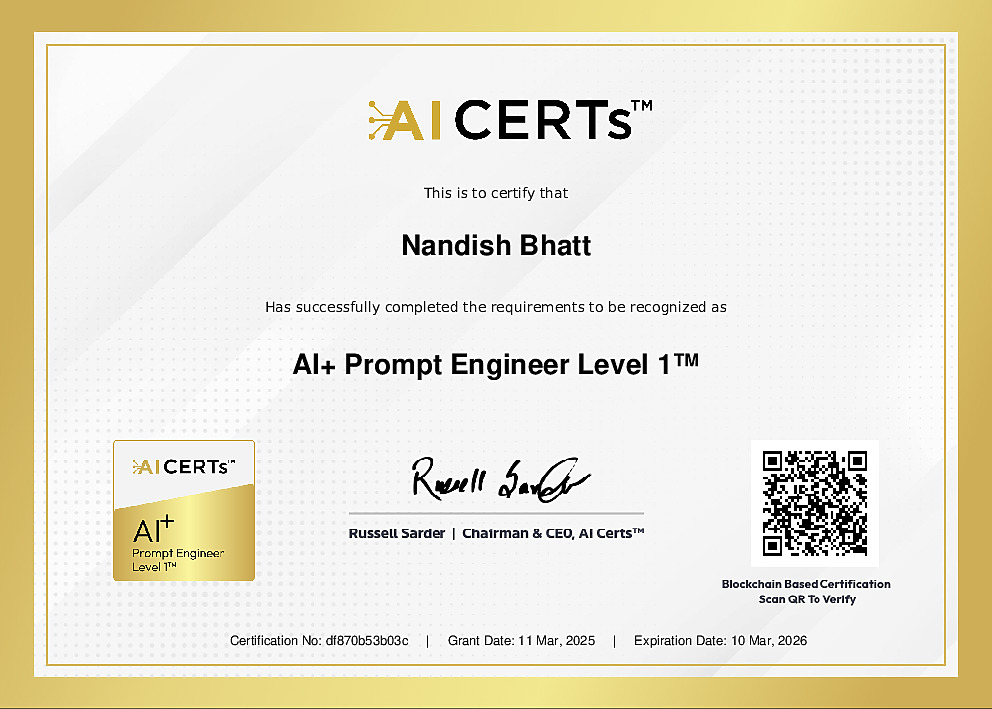

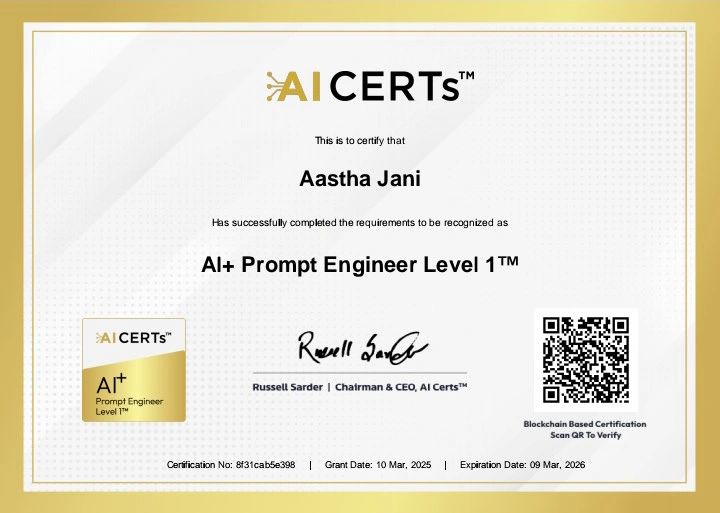

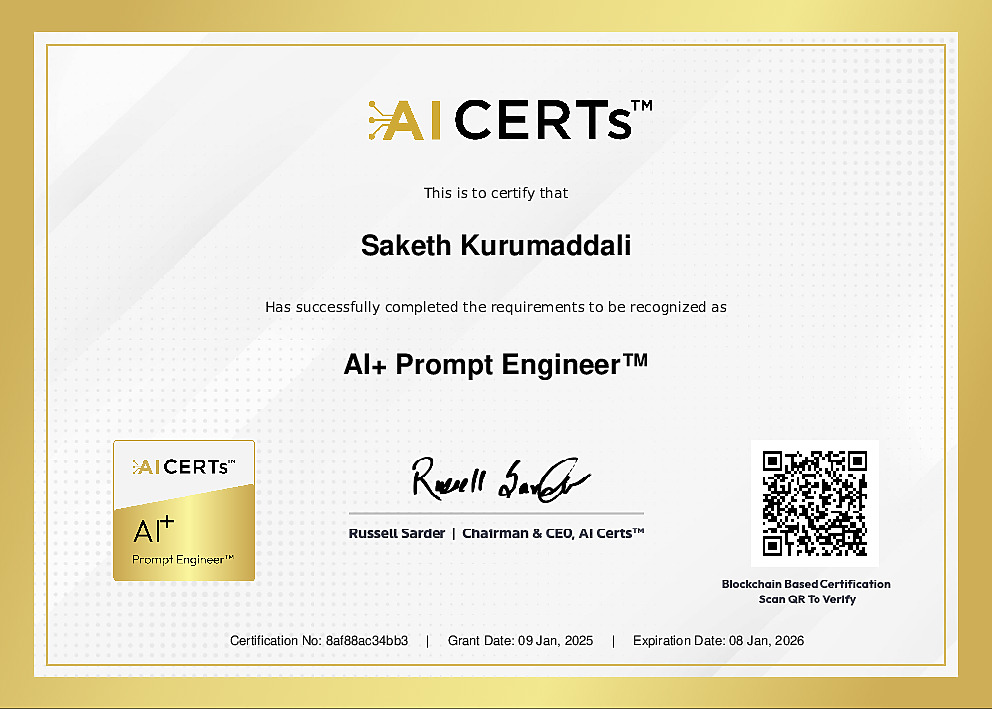

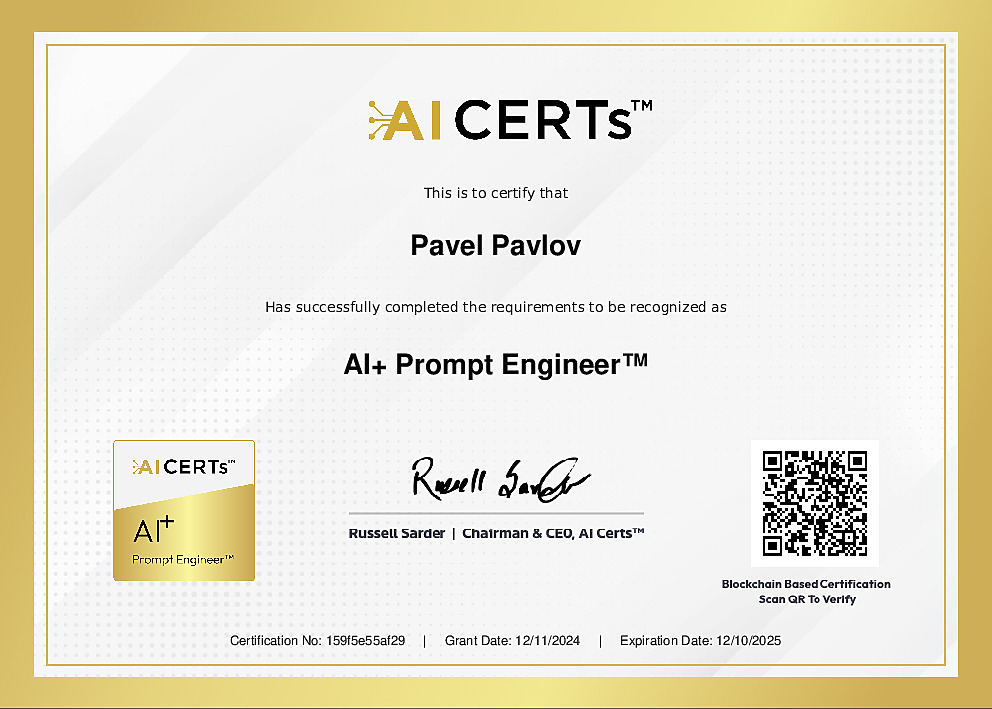

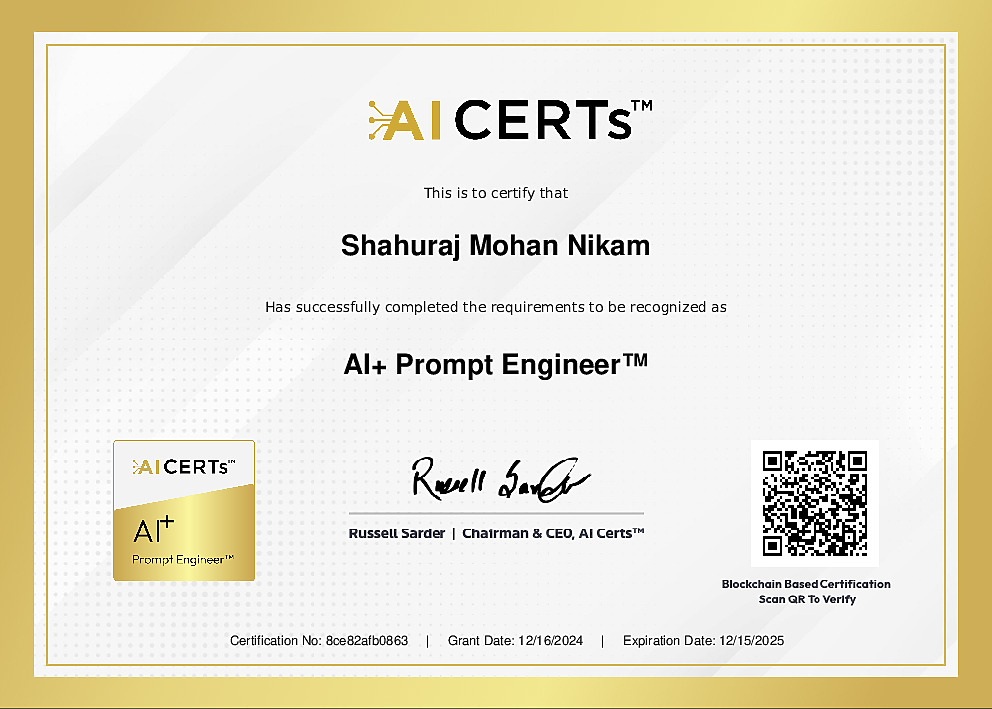

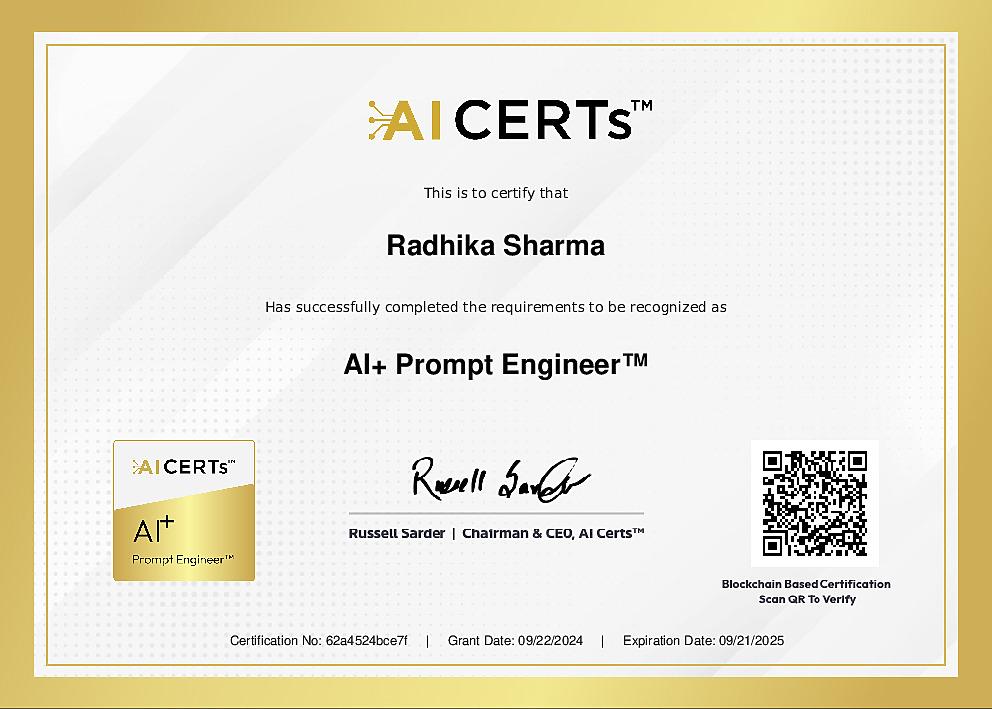

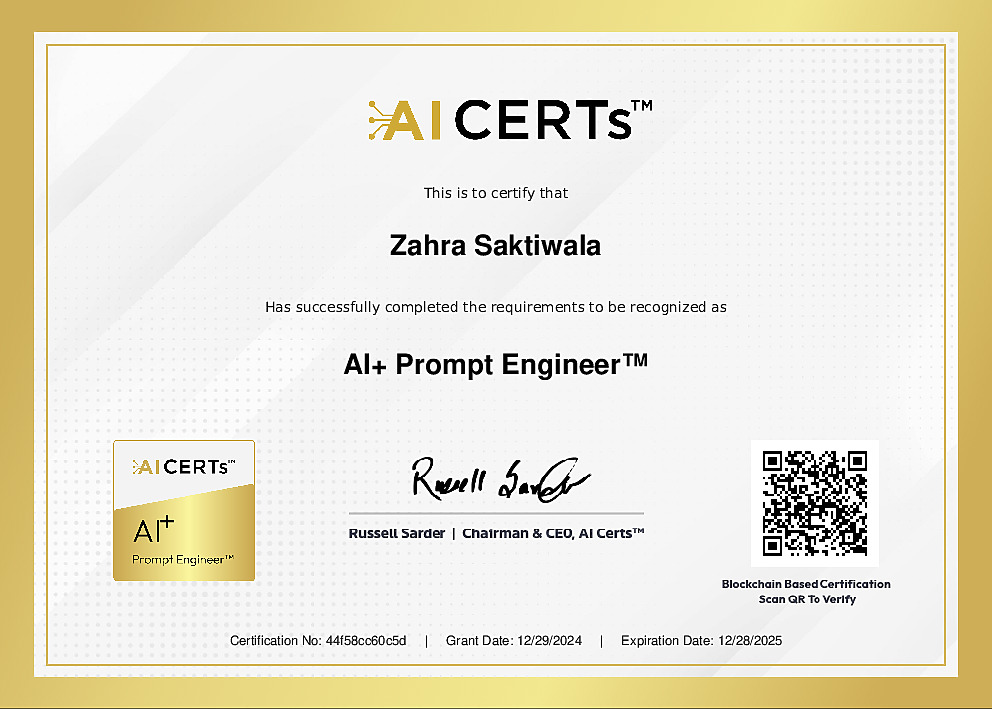

 Equipped to lead in the era of innovation and technology!
Equipped to lead in the era of innovation and technology!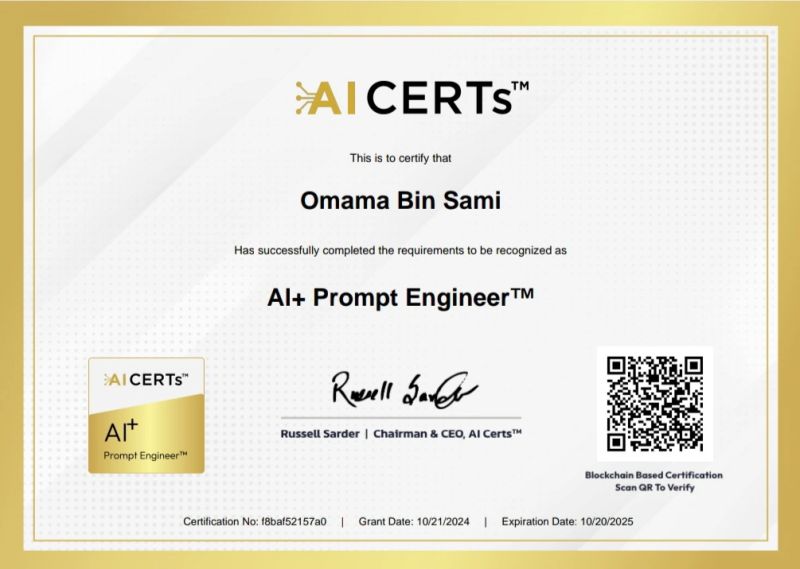

 Excited to announce that I've completed the AI+ Prompt Engineer Certification from AI Certs!
Excited to announce that I've completed the AI+ Prompt Engineer Certification from AI Certs!  This comprehensive program imparts skills in AI fundamentals, prompt engineering, natural language processing, and project-based learning. I'm excited to apply this knowledge to drive innovation and enhance efficiency in AI projects.
Thank you, AI CERTs™, for this incredible opportunity!"
This comprehensive program imparts skills in AI fundamentals, prompt engineering, natural language processing, and project-based learning. I'm excited to apply this knowledge to drive innovation and enhance efficiency in AI projects.
Thank you, AI CERTs™, for this incredible opportunity!"
